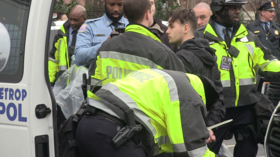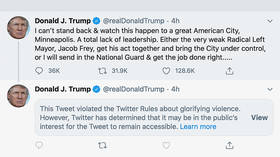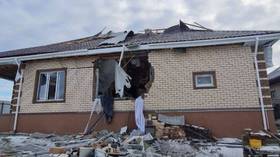CNN reporter's breeze-through arrest in Minneapolis looked COMPLETELY different from my arrest covering riots for Russian media

CNN reporter Omar Jimenez’s arrest during riots in Minneapolis over police brutality is a banal chapter in the history of police abuse of reporters. My own arrest and the arrests of my peers in alternative media demonstrate this.
The camera still rolled as police in Minneapolis arrested reporter Jimenez on Friday morning. Astonished anchor John Berman remarked that “this is an American television reporter...being led away by police officers.” Unlike Jimenez, my own arrest while reporting on a riot for Russian television was not celebrated as an act of journalistic heroism.
On the day of Donald Trump’s inauguration to the presidency, protesters took over the streets of DC. I live-streamed most of the protest and followed the [anarchist] “black bloc,” dodging tear gas and pepper spray. At one point, I heard shouts of “move,” and as I began to take my first step I was struck from behind, I believe by a baton. I got back up and started again. A short while later, after my stream went down, I was hit close to point-blank in the face by pepper spray, had “stingball grenades” deployed within feet of me, and was arrested. Like the CNN reporter, I showed my press credentials.
BREAKING: Judge sealed felony riot charge against me on ruling of actual innocence. US Attorney's Office no longer able to re-open charges.Video of my statement that failed to upload on #J20.Read my account of what happened & what it means for America https://t.co/fEafHwceXipic.twitter.com/9H06aTN27J
— Alex Rubinstein (@RealAlexRubi) December 4, 2017
As I waited in line surrounded by police, alongside more than 200 protesters and a handful of other journalists, the officer who would arrest me chatted me up about working for RT America. I spent the next 25 hours in jail before walking out of a courthouse with a felony rioting charge that carried a maximum sentence of 10 years in prison. Other journalists faced 60 years behind bars. The charges against me were dropped more quickly than the charges against other journalists – shortly after Maria Zakharova, spokeswoman for the Russain Foreign Ministry, spoke of my case.
The corporate reporters were let out of the police cordon before any arrests were made.
READ MORE: ‘Outrage!’ 6 journalists including RT reporter face ‘inappropriate’ rioting charges
This injustice didn’t incite the passions of liberals or mainstream media gatekeepers, who preferred their interests be represented by protesters who wear pink hats. In fact, my employment made me the subject of conspiracy theories about Kremlin attempts to “sow chaos” and plant a “false flag” at the tumultuous scene in DC.
How did I forget about that time Vladimir Putin paid me one million rubles through my pro-Trump Russian PR firm to false flag anti-Trump protesters during his inauguration? pic.twitter.com/6GIGKYZ4cA
— Alex Rubinstein (@RealAlexRubi) December 24, 2017
But on Friday, cable news viewers across the US awoke to a development in Minneapolis that shocked their liberal sensibilities to their core: police, clad in riot gear and in formation, appearing over an urban backdrop clouded by tear gas, arrested a black CNN reporter along with his producer and cameraman.
Live on national television, police casually informed Jimenez that he was being placed under arrest. Jimenez spent the following hour in police custody before appearing back on CNN 90 minutes later. In the time that intervened, CNN President Jeff Zucker called Minnesota Governor Tim Walz, who publicly apologized and worked to secure the timely release of Jimenez and his colleagues, swearing that their detention by cops was “inadvertent.”
Also on rt.com WATCH CNN crew ARRESTED during LIVE BROADCAST covering unrest in MinneapolisOne wonders – and this journalist certainly hopes the answer to be in the negative – whether Jimenez ever made it to a jail cell, whether he was fingerprinted, or whether he even made it as far as the back of a squad car. It is difficult to imagine that the police do not have CNN’s feed up in their precincts and that the highest levels of local and state law enforcement were not quickly made aware of the unfolding scandal their officers were inviting upon themselves.
With a distinctly existential flavor, liberal commentators quickly lashed out with death cries for American democracy. That’s not hyperbole. To give a quick impression: one leading black filmmaker and commentator in the US said the arrest of Jimenez “shows a turning point in the war that Trump is waging. That’s not hyperbole. Destabilizing the election. Press freedoms compromised.”
Minnesota governor Tim Walz to CNN chief Jeff Zucker just now: "I will publicly address what happened this morning and apologize to the crew. You are essential to our democracy and your ability to report must be unhindered."
— Brian Stelter (@brianstelter) May 29, 2020
But this isn’t just a tale of two riot reporters.
I have never worked in corporate media. I’ve never been given the chance to “stick it” to Trump with a tough gotcha from the White House briefing room. I have, however, worked for foreign and alternative media outlets. I’ve witnessed and filmed hundreds upon hundreds of arrests and I have been arrested and detained for reporting on two separate occasions.
While I do not live in elite media bubbles – you know, where the “heroes” are made – I have known many who, like me, have worked in alternative and independent media. I can say with confidence that if you spend enough time reporting in the field in the US without the institutional support of a major outlet, it is more than likely that you will face arrest at some point in your career, and I know dozens it has happened to.
For the purpose of brevity, let’s look at just a few. It was, for example, only in 2017 that a number of journalists were arrested at a different Black Lives Matter protest in Minneapolis. The incident was largely ignored by the mainstream media even though reporters were actually brutalized in that incident.
My arresting officer is my "biggest fan" (his words) and that's why he chose me for arrest personally. They watch all my streams/tweets. https://t.co/osJoWnUqcU
— Jon Ziegler “Reb Z” (@Rebelutionary_Z) September 19, 2017
Another notable example was the arrest last year of The Grayzone editor Max Blumenthal, who was charged as a co-defendant alongside my brother in an apparent attempt by the police, working with the State Department, to intimidate us as we were reporting on the siege of Venezuela’s embassy in Washington, DC.
And chief among the examples of a double-standard in outcry over the mistreatment of journalists by the US is, of course, Julian Assange. Wanted in part for exposing the extrajudicial killing of Reuters journalists by the US military, the recent revelations that the CIA was involved with spying and planning to kidnap the WikiLeaks editor were not explosive enough to make it into mainstream news reports.
Now you listen here, Ayatollah. Don't you go shooting at protesters and jailing reporters. That's America's job pic.twitter.com/1xnSQ8NrLY
— Alex Rubinstein (@RealAlexRubi) May 29, 2020
In comparison to being hauled out of the Ecuadorian Embassy in London after enduring years of isolation and spying, black operations (including the rummaging through a trash can to find a baby’s diaper in hopes of proving a DNA connection to Assange), the arrest of Jimenez was less than remarkable: police told him and his crew to move and when they did not do it fast enough, arrested them.
After watching the news and listening to the flood of opinions over Mr. Jimenez’s ordeal, one is left to wonder which upsets them more: the arrest of a corporate media reporter or Trump’s threat on Friday morning to have looters shot – a call for violence against civilians that would have been met with resounding calls for regime change had it been uttered by, say, Vladimir Putin or any other foreign leader with a target on their back.
Like this story? Share it with a friend!
The statements, views and opinions expressed in this column are solely those of the author and do not necessarily represent those of RT.













